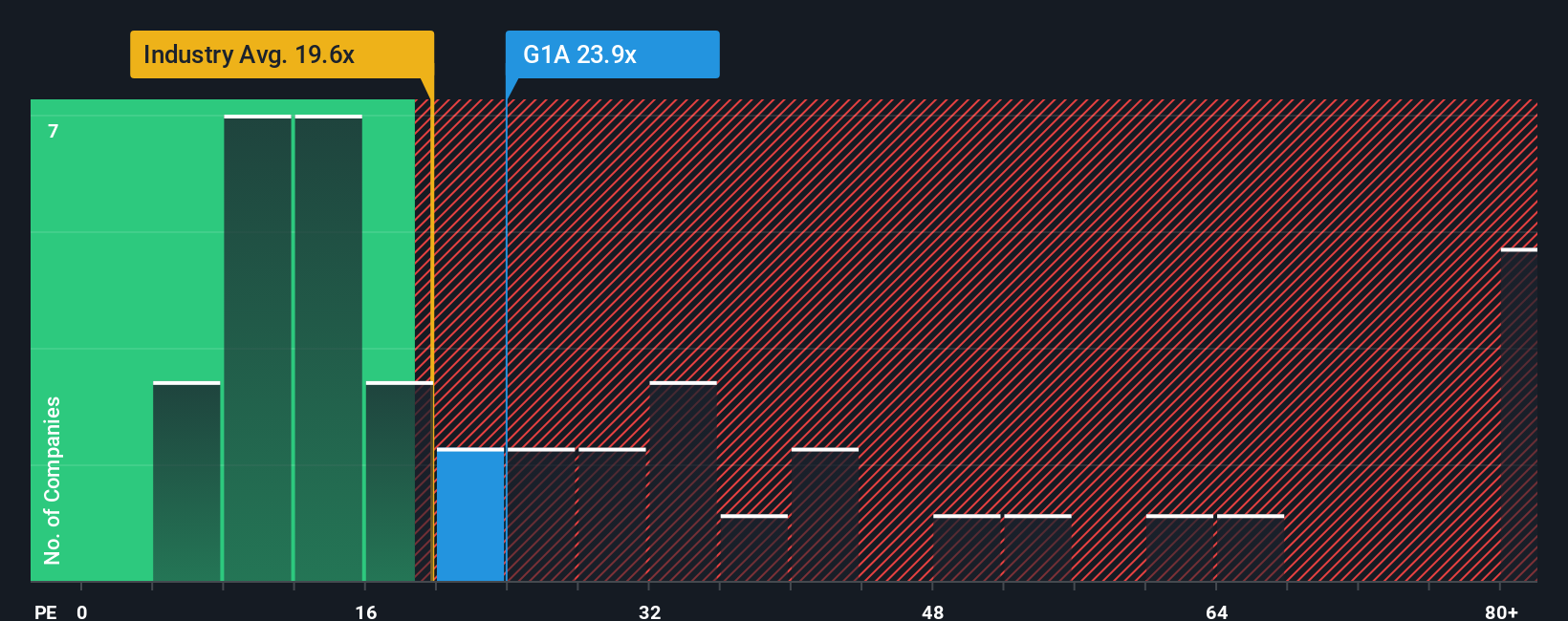Some Shareholders Feeling Restless Over GEA Group Aktiengesellschaft's (ETR:G1A) P/E Ratio
With a price-to-earnings (or "P/E") ratio of 23.9x GEA Group Aktiengesellschaft (ETR:G1A) may be sending bearish signals at the moment, given that almost half of all companies in Germany have P/E ratios under 18x and even P/E's lower than 11x are not unusual. However, the P/E might be high for a reason and it requires further investigation to determine if it's justified.
GEA Group could be doing better as it's been growing earnings less than most other companies lately. One possibility is that the P/E is high because investors think this lacklustre earnings performance will improve markedly. If not, then existing shareholders may be very nervous about the viability of the share price.
See our latest analysis for GEA Group

Does Growth Match The High P/E?
In order to justify its P/E ratio, GEA Group would need to produce impressive growth in excess of the market.
Retrospectively, the last year delivered virtually the same number to the company's bottom line as the year before. However, a few strong years before that means that it was still able to grow EPS by an impressive 38% in total over the last three years. So we can start by confirming that the company has done a great job of growing earnings over that time.
Turning to the outlook, the next three years should generate growth of 13% per annum as estimated by the analysts watching the company. With the market predicted to deliver 17% growth per annum, the company is positioned for a weaker earnings result.
With this information, we find it concerning that GEA Group is trading at a P/E higher than the market. Apparently many investors in the company are way more bullish than analysts indicate and aren't willing to let go of their stock at any price. There's a good chance these shareholders are setting themselves up for future disappointment if the P/E falls to levels more in line with the growth outlook.
What We Can Learn From GEA Group's P/E?
While the price-to-earnings ratio shouldn't be the defining factor in whether you buy a stock or not, it's quite a capable barometer of earnings expectations.
Our examination of GEA Group's analyst forecasts revealed that its inferior earnings outlook isn't impacting its high P/E anywhere near as much as we would have predicted. Right now we are increasingly uncomfortable with the high P/E as the predicted future earnings aren't likely to support such positive sentiment for long. This places shareholders' investments at significant risk and potential investors in danger of paying an excessive premium.
A lot of potential risks can sit within a company's balance sheet. Take a look at our free balance sheet analysis for GEA Group with six simple checks on some of these key factors.
You might be able to find a better investment than GEA Group. If you want a selection of possible candidates, check out this free list of interesting companies that trade on a low P/E (but have proven they can grow earnings).
New: Manage All Your Stock Portfolios in One Place
We've created the ultimate portfolio companion for stock investors, and it's free.
• Connect an unlimited number of Portfolios and see your total in one currency
• Be alerted to new Warning Signs or Risks via email or mobile
• Track the Fair Value of your stocks
Have feedback on this article? Concerned about the content? Get in touch with us directly. Alternatively, email editorial-team (at) simplywallst.com.
This article by Simply Wall St is general in nature. We provide commentary based on historical data and analyst forecasts only using an unbiased methodology and our articles are not intended to be financial advice. It does not constitute a recommendation to buy or sell any stock, and does not take account of your objectives, or your financial situation. We aim to bring you long-term focused analysis driven by fundamental data. Note that our analysis may not factor in the latest price-sensitive company announcements or qualitative material. Simply Wall St has no position in any stocks mentioned.
About XTRA:G1A
GEA Group
Produces and supplies systems and components to the food, beverage, and pharmaceutical industries worldwide.
Flawless balance sheet established dividend payer.
Similar Companies
Market Insights
Community Narratives



